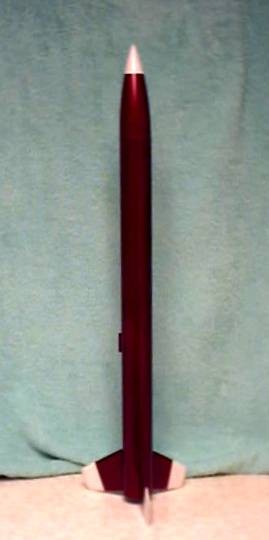Scratch 3F 3M NC Original Design / Scratch Built
Scratch - 3F 3M NC {Scratch}
Contributed by Jason Toft
| Manufacturer: | Scratch |
 Brief: Three fins, Three motors, and a Nose Cone. A very simple
design
Brief: Three fins, Three motors, and a Nose Cone. A very simple
design
Construction:
- (1) Estes BT-60 19 inche
- (1) PNC-60AH Nose Cone
- (3) Swept clipped delta fins from 1/8 inch balsa
- (1) 12 to 16 inch parachute
- (1) 10 inch length of bt-20 tubing
- (3) thrust rings
- (1) BT-60 centering ring
- (1) 2 inch length of 1/8 launch lug
- (1) 3-4 foot length of 1/4 inch shock cord
Thanks to Tim Van Milligan at Apogee Components for providing the BT-60 body. The body tube was cut to a length of 19 inches and set aside. The BT-20 motor mount was cut into 3 - 3 inch pieces and then the thrust rings glued in. They are glued together into a triangular shape. Fins were cut out into a slightly swept clipped delta and given a coat of Elmer's Fill n Finish and then given airfoiled edges. The motor mounts, now dry, is glued in the body flush with the end of the tube. The spaces are filled with putty and then the whole end is covered with a light coating of wood glue for sealant. The tube is marked for three fins and they are glued on. Do glue fillets when dry. Build a shock cord mount and attach to the interior of the body tube. Attach the shock cord to the nose and the parachute about 6 inches down the shock cord. Cut the launch lug into to 1 inch pieces and attach one near the empty CG point, about 8 inches from the rear of the body tube, and the other 2 i! nches from the end of the tube. No real "gotcha's" except just to watch the fins as they dry.
Finishing: The rocket was given a 2 coats of gray primer, a coat of flat white, then I masked off the tip of the nose cone and 1 inch of the tips of the fins. I then gave the rocket a few coats of a beautiful dark red. The rocket is then given a gloss clear coat.
Flight: The first flight was at a local park using three B6-4's. The rocket was prepped normally with wadding and motors installed. A clip-whip was used to ensure ignition. A 5-count was given. Ignition was very slow. The rocket lifted of the pad, climbed about 50 feet then fell horizontal and headed about 300 feet downrange. It barely slowed down before ejection. The chute popped and rocket was recovered. Upon inspection to see what went wrong, we found that only two motors lit, apparently causing the rocket to head downrange like it did. No damage was apparent. I believe that the one motor did not light because of not enough power, causing only two motors to light before the third could.
Second flight was at the ICBM Freedom Launch 2002. I borrowed a 16 inch nylon parachute from my Aerotech Mustang in place of the 12 inch plastic one. The rocket was prepped using 3 B6-4's. Clip-whips were used. The rocket had plenty of power this time, climbing to about 600 feet. Liftoff was very quick, with power translating out to about a D18, I think. Ejection was just before apogee. The rocket was recovered with no damage.
Summary: Overall, this is a great cluster rocket.
Sponsored Ads
 |
 |











